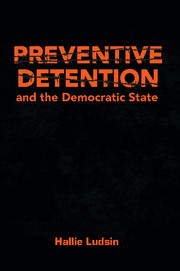Book contents
- Frontmatter
- Contents
- Acknowledgements
- List of Acronyms and Abbreviations
- Introduction
- 1 The Theoretical Framework
- 2 The Policy Debates
- 3 Preventive Detention under International Law
- 4 The History of Preventive Detention in India
- 5 India's Current Preventive Detention Legislation
- 6 India: Preventive Detention and Due Process
- 7 India: The Risk Society and the Slippery Slope
- 8 Preventive Detention in England
- 9 England: Preventive Detention and Due Process
- 10 Preventive Detention in the United States
- 11 The United States: Preventive Detention and Procedural Due Process
- 12 Preventive Detention's Slippery Slope
- 13 Preventive Detention and Liberal Democracy
- Index
7 - India: The Risk Society and the Slippery Slope
Published online by Cambridge University Press: 05 March 2016
- Frontmatter
- Contents
- Acknowledgements
- List of Acronyms and Abbreviations
- Introduction
- 1 The Theoretical Framework
- 2 The Policy Debates
- 3 Preventive Detention under International Law
- 4 The History of Preventive Detention in India
- 5 India's Current Preventive Detention Legislation
- 6 India: Preventive Detention and Due Process
- 7 India: The Risk Society and the Slippery Slope
- 8 Preventive Detention in England
- 9 England: Preventive Detention and Due Process
- 10 Preventive Detention in the United States
- 11 The United States: Preventive Detention and Procedural Due Process
- 12 Preventive Detention's Slippery Slope
- 13 Preventive Detention and Liberal Democracy
- Index
Summary
Chapter 7 ties together Part II by placing India's experiences within the themes described in Chapter 1. Tracking Chapter 1's analysis, this chapter underscores that India is a risk society on par with the liberal democracies described in Ulrich Beck's theory. It draws out who India considers the deviant other, the circumstances it believes are sufficiently exceptional to justify a state of exception and the cost-benefit analysis that underlies the ready adoption of preventive detention. It then narrates the normalization of preventive detention as a law and order tool and India's descent to the bottom of preventive detention's slippery slope. The chapter concludes with a description of the harm preventive detention has inflicted on India's democracy. This discussion is used in later chapters to locate the United States and England on that same slippery slope and to illustrate the type of harm they risk as they increase their preventive detention powers.
Before moving into the substance of the chapter, some might challenge the idea of India as the bottom of the slippery slope for a democratic country when detainees constitute only a small percentage of the prison population. Prison statistics show that, for the last few years, detainees make up roughly 6 per cent of India's prison population, or approximately 2000 people. This number is deceiving. A detention order lasts, at most, one to two years. The statistic of 2000 people, thus, does not reflect a static group of detainees – the same 2000 people are not held in detention each year. The government likely has detained tens of thousands of people, if not more, over the years to achieve this rate. The number is also deceptive because the bulk of people in India's prisons are pre-trial detainees – roughly 66 per cent of the prison population. The average length of pretrial detention is 266 days and many pretrial detainees are held for years. The government only needs detention if there is any possibility dangerous people will be released. It does not need detention as long as it can hold them in pretrial detention for lengthy periods of time. As a final point, if a country substituted preventive detention for prosecution at a large scale, it is unlikely it would continue to be categorized as a democracy or at least as a democracy of a type that should or could be compared to a liberal democracy.
- Type
- Chapter
- Information
- Preventive Detention and the Democratic State , pp. 195 - 223Publisher: Cambridge University PressPrint publication year: 2016



